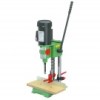Harbor Freight Tools 35570 User Manual - Page 4
Voltage Warning, Extension Cords, Unpacking
 |
View all Harbor Freight Tools 35570 manuals
Add to My Manuals
Save this manual to your list of manuals |
Page 4 highlights
and put the screw through the green ear. Plug the adapter's two prongs into the outlet, and replace the center screw. Now plug the machine into the adapter. VOLTAGE WARNING Before connecting the tool to a power source (receptacle, outlet, etc.) be sure the voltage supplied is about the same as that specified on the nameplate of the tool. If one says 120V and the other says 110V then there will be no complications. Never try to plug a 110V into a 220V outlet, or the other way around. The plug and outlet have completely different shapes. This is because a power source with a voltage greater than that specified on the tool can result in a SERIOUS INJURY to the user- as well as damage to the tool. If in doubt, DO NOT PLUG IN THE TOOL. Using a power source with voltage (110V) less than the nameplate rating (220V) is harmful to the motor. EXTENSION CORDS Since your tool has a grounded, three-prong plug, you must use a three-prong extension cord with three prong receptacles. Only use rounded jacket extension cords, preferable listed by the Underwriters Laboratories (UL). Make sure the cord is rated for outdoor use if you plan on using the tool outside; if you plan on indoor use, you may also use an outdoor rated cord. Extension cords rated for outdoor use have the letters "WA" on the cord jacket. The extension cord must have a minimum wire size depending on the amperage of the tool and the length of the extension cord. This size is signified by its AWG (American Wire Gauge) rating; the smaller the gauge, the greater the cable's capacity. If you are using two or more cords, the total length of the combined cords must be used to determine the minimum AWG rating. Each of the cords used must meet this rating. The chart below is used to determine the rating required according to the length of the cord(s). The amps of your tool are found either in this manual, or on the nameplate of the tool. CORD(S) LENGTH (FEET) 25 50 75 100 125 150 175 200 WIRE GAUGE REQUIRED 18 18 16 16 14 14 12 12 Always inspect extension cords for any damage. If there are any loose, frayed or exposed wires, damaged insulation, or defective connections, replace the cord. Harbor Freight Tools can supply UL listed and outdoor rated cords in multiple AWG ratings if needed. UNPACKING Make sure your tool includes all accessories and pieces required for operation. Check off according to the list below. If any pieces are missing, contact Harbor Freight Tools at the number on the front cover. 1. Mortising Machine 2. Handle (24) SKU 35570 Page 4













